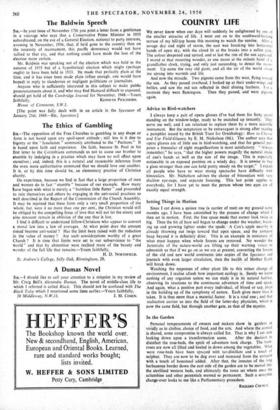Advice to Bird-watchers
I always keep a pair of opera glasses (I've had them for forty years) standing on the window-ledge, ready to be snatched up instantly. They serve me well, and I am reluctant to replace them by a more scientific instrument. But the temptation to be extravagant-is strong after reading a pamphlet issued by the British Trust for Ornithology: How to Choose and Use Field-Glasses, by E. M. Nicholson (9d.). The author says that opera' glasses are of little use in bird-watching, and that for general pur- poses a binocular of eight magnifications is most satisfactory. "Always remember," he says, "that the higher powers magnify the natural shake of one's hands as well as the size of the image. This is especially noticeable in an exposed position on a windy day. It is unwise to buy a glass stronger than one can hold pretty steady on the target." I expect all people who have to wear strong spectacles have difficulty with binoculars. Mr. Nicholson advises the choice of binoculars with very shallow eye-cups, and separate focusing. This last point applies to everybody, for I 'lave yet to meet the person whose two eyes are of exactly equal strength.














































































 Previous page
Previous page